山东省淄博市淄川第一中学2015-2016学年高二下学期期中考试英语试题 Word版含答案.doc
- 格式:doc
- 大小:136.50 KB
- 文档页数:18
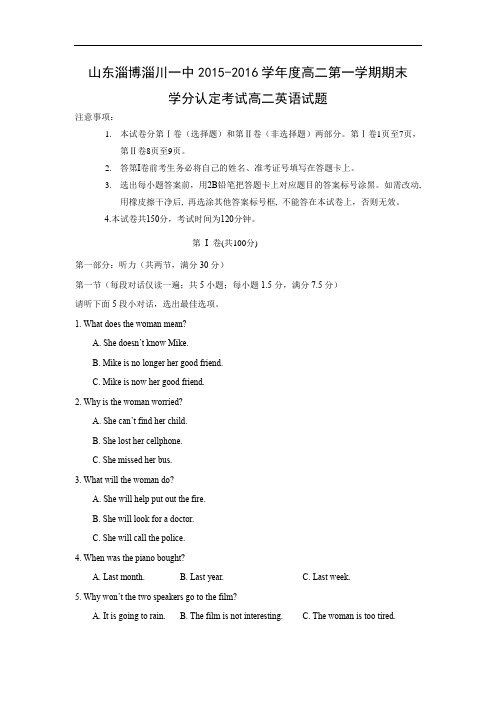
山东淄博淄川一中2015-2016学年度高二第一学期期末学分认定考试高二英语试题注意事项:1.本试卷分第Ⅰ卷(选择题)和第Ⅱ卷(非选择题)两部分。
第Ⅰ卷1页至7页,第Ⅱ卷8页至9页。
2.答第I卷前考生务必将自己的姓名、准考证号填写在答题卡上。
3.选出每小题答案前,用2B铅笔把答题卡上对应题目的答案标号涂黑。
如需改动,用橡皮擦干净后, 再选涂其他答案标号框, 不能答在本试卷上,否则无效。
4.本试卷共150分,考试时间为120分钟。
第I 卷(共100分)第一部分:听力(共两节,满分30分)第一节(每段对话仅读一遍;共5小题;每小题1.5分,满分7.5分)请听下面5段小对话,选出最佳选项。
1. What does the woman mean?A. She doesn’t know Mike.B. Mike is no longer her good friend.C. Mike is now her good friend.2. Why is the woman worried?A. She can’t find her child.B. She lost her cellphone.C. She missed her bus.3. What will the woman do?A. She will help put out the fire.B. She will look for a doctor.C. She will call the police.4. When was the piano bought?A. Last month.B. Last year.C. Last week.5. Why won’t the two speakers go to the film?A. It is going to rain.B. The film is not interesting.C. The woman is too tired.第二节(每段对话读两遍;共15小题; 每小题1.5分,满分22.5分)请听下面5段对话或独白,选出最佳选项。
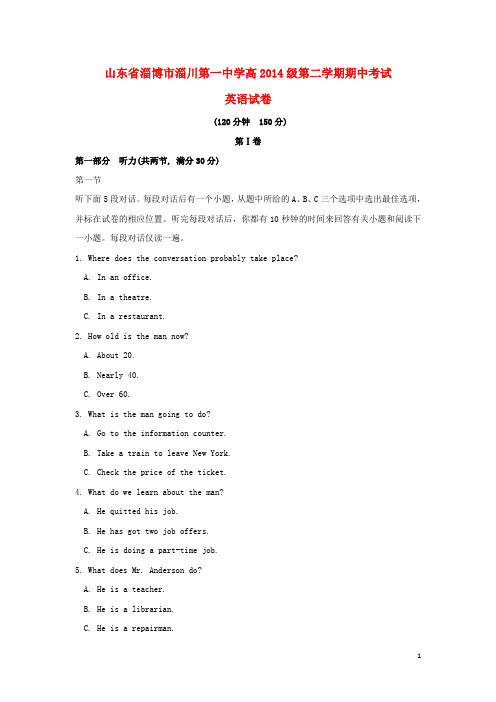
山东省淄博市淄川第一中学高2014级第二学期期中考试英语试卷(120分钟150分)第Ⅰ卷第一部分听力(共两节, 满分30分)第一节听下面5段对话。
每段对话后有一个小题,从题中所给的A、B、C三个选项中选出最佳选项,并标在试卷的相应位置。
听完每段对话后,你都有10秒钟的时间来回答有关小题和阅读下一小题。
每段对话仅读一遍。
1. Where does the conversation probably take place?A. In an office.B. In a theatre.C. In a restaurant.2. How old is the man now?A. About 20.B. Nearly 40.C. Over 60.3. What is the man going to do?A. Go to the information counter.B. Take a train to leave New York.C. Check the price of the ticket.4. What do we learn about the man?A. He quitted his job.B. He has got two job offers.C. He is doing a part-time job.5. What does Mr. Anderson do?A. He is a teacher.B. He is a librarian.C. He is a repairman.第二节听下面5段对话或独白。
每段对话或独白后有2至4个小题,从题中所给的A、B、C三个选项中选出最佳选项,并标在试卷的相应位置。
听每段对话或独白前,你将有5秒钟的时间阅读各个小题;听完后,各小题将给出5秒钟的作答时间。
每段对话或独白读两遍。
听下面一段对话,回答第6和第7题。
6. What is The Western Teacher?A. A story.B. A book.C. A magazine.7. When did the man start writing books?A. When he was at school.B. After he came to Paris.C. Since the year of 2004.听下面一段对话,回答第8至第10题。
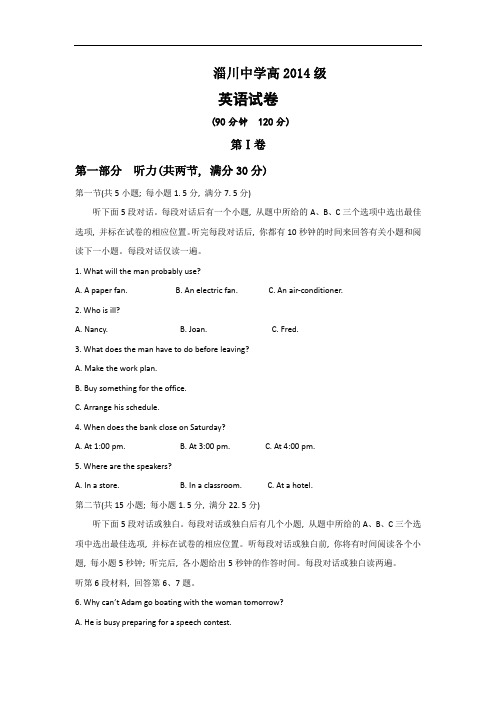
淄川中学高2014级英语试卷(90分钟120分)第Ⅰ卷第一部分听力(共两节, 满分30分)第一节(共5小题; 每小题1. 5分, 满分7. 5分)听下面5段对话。
每段对话后有一个小题, 从题中所给的A、B、C三个选项中选出最佳选项, 并标在试卷的相应位置。
听完每段对话后, 你都有10秒钟的时间来回答有关小题和阅读下一小题。
每段对话仅读一遍。
1. What will the man probably use?A. A paper fan.B. An electric fan.C. An air-conditioner.2. Who is ill?A. Nancy.B. Joan.C. Fred.3. What does the man have to do before leaving?A. Make the work plan.B. Buy something for the office.C. Arrange his schedule.4. When does the bank close on Saturday?A. At 1:00 pm.B. At 3:00 pm.C. At 4:00 pm.5. Where are the speakers?A. In a store.B. In a classroom.C. At a hotel.第二节(共15小题; 每小题1. 5分, 满分22. 5分)听下面5段对话或独白。
每段对话或独白后有几个小题, 从题中所给的A、B、C三个选项中选出最佳选项, 并标在试卷的相应位置。
听每段对话或独白前, 你将有时间阅读各个小题, 每小题5秒钟; 听完后, 各小题给出5秒钟的作答时间。
每段对话或独白读两遍。
听第6段材料, 回答第6、7题。
6. Why can’t Adam go boating with the woman tomorrow?A. He is busy preparing for a speech contest.B. He is taking a vacation in China now.C. He has to work overtime tomorrow.7. What will the man do tomorrow?A. Read a new book.B. Write at home all day.C. Spend an hour in the park.听第7段材料, 回答第8、9题。
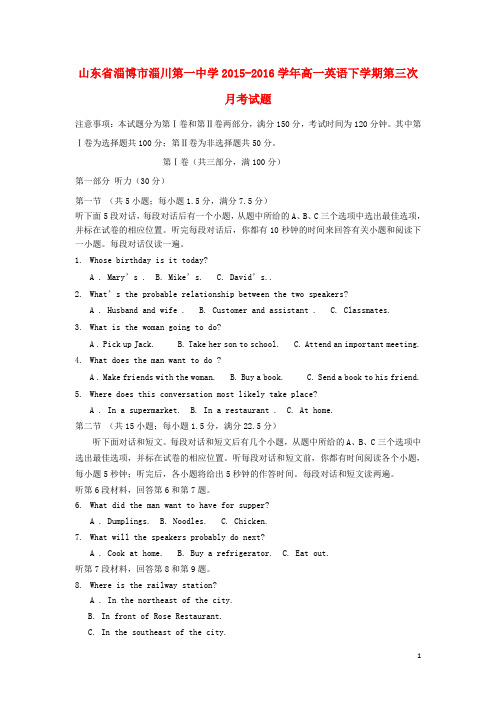
山东省淄博市淄川第一中学2015-2016学年高一英语下学期第三次月考试题注意事项:本试题分为第Ⅰ卷和第Ⅱ卷两部分,满分150分,考试时间为120分钟。
其中第Ⅰ卷为选择题共100分;第Ⅱ卷为非选择题共50分。
第Ⅰ卷(共三部分,满100分)第一部分听力(30分)第一节(共5小题;每小题1.5分,满分7.5分)听下面5段对话,每段对话后有一个小题,从题中所给的A、B、C三个选项中选出最佳选项,并标在试卷的相应位置。
听完每段对话后,你都有10秒钟的时间来回答有关小题和阅读下一小题。
每段对话仅读一遍。
1.Whose birthday is it today?A . Mary’s . B. Mike’s. C. David’s..2.What’s the probable relationship between the two speakers?A . Husband and wife . B. Customer and assistant . C. Classmates.3.What is the woman going to do?A . Pick up Jack. B. Take her son to school. C. Attend an important meeting.4.What does the man want to do ?A . Make friends with the woman. B. Buy a book. C. Send a book to his friend.5.Where does this conversation most likely take place?A . In a supermarket. B. In a restaurant . C. At home.第二节(共15小题;每小题1.5分,满分22.5分)听下面对话和短文。
每段对话和短文后有几个小题,从题中所给的A、B、C三个选项中选出最佳选项,并标在试卷的相应位置。
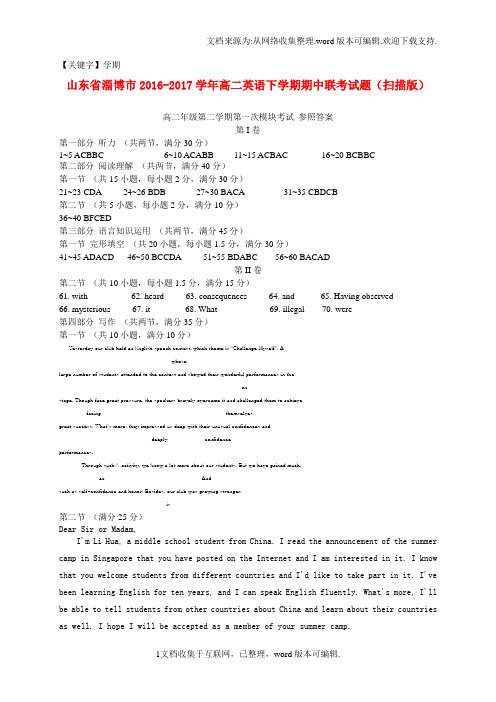
【关键字】学期山东省淄博市2016-2017学年高二英语下学期期中联考试题(扫描版)高二年级第二学期第一次模块考试参照答案第I卷第一部分听力(共两节,满分30分)1~5 ACBBC 6~10 ACABB 11~15 ACBAC 16~20 BCBBC第二部分阅读理解(共两节,满分40分)第一节(共15小题,每小题2分,满分30分)21~23 CDA 24~26 BDB 27~30 BACA 31~35 CBDCB第二节(共5小题,每小题2分,满分10分)36~40 BFCED第三部分语言知识运用(共两节,满分45分)第一节完形填空(共20小题,每小题1.5分,满分30分)41~45 ADACD 46~50 BCCDA 51~55 BDABC 56~60 BACAD第II卷第二节(共10小题,每小题1.5分,满分15分)61. with 62. heard 63. consequences 64. and 65. Having observed66. mysterious 67. it 68. What 69. illegal 70. were第四部分写作(共两节,满分35分)第一节(共10小题,满分10分)Yesterday our club held an English speech contest, which theme is “Challenge Myself”. Awhoselarge number of students attended to the contest and showed their wonderful performances in theonstage. Though face great pressure, the speakers bravely overcame it and challenged them to achievefacing themselvesgreat success. What’s more, they impressed us deep with their unusual confidences anddeeply confidenceperformances.Through such∧ activity, we know a lot more about our students. But we have gained much,an Andsuch as self-confidence and honor. Besides, our club was growing stronger.is第二节(满分25分)Dear Sir or Madam,I'm Li Hua, a middle school student from China. I read the announcement of the summer camp in Singapore that you have posted on the Internet and I am interested in it. I know that you welcome students from different countries and I'd like to take part in it. I've been learning English for ten years, and I can speak English fluently. What's more, I'll be able to tell students from other countries about China and learn about their countries as well. I hope I will be accepted as a member of your summer camp.Looking forward to your reply!Regards, Li Hua此文档是由网络收集并进行重新排版整理.word可编辑版本!。
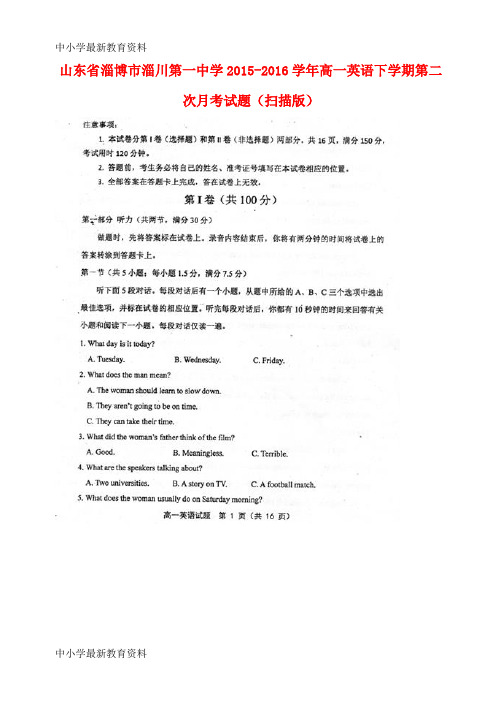
山东省淄博市淄川第一中学2015-2016学年高一英语下学期第二次月考试题(扫描版)高一英语参考答案 2016.4第一部分听力(共20小题;每题1分,满分20分)1—5ABACB 6—10BACBB 11—15ACCAB 16—20ABABC第二部分阅读理解 (共15小题;每小题2分,满分30分)21-25 CBBAB 26-30 CDCAC 31-35 EGDAF第三部分英语知识运用(共两节,满分40分)第一节完形填空(共20小题;每小题1分,满分20分)36-40 BDCBA 41-45ADCAA 46-50 CCBDC 51-55ABBDA第二节语法填空 (共10小题;每小题1.5分,满分15分)56. was waiting 57. to 58. Going 59. that60.surrounded61.to live 62.rapidly 63. wealthy 64. the 65.mixture 第四部分写作(共三节,满分40分)第二节短文改错(共10小题;每小题1分,满分10分)Mark Twain was born in Florida. He was being brought up along the Mississppi River. He iswell-known for his novel The Million Pound Bank Note, that tells us that two brothers havewhichmade a bet. One believes that on a million pound note a man is able to survive a month inwithLondon. On∧ contrary, his brother doubts it. By accidents, a young man in rags turned up.the accident turns They give him a large sum of money but tell him to spend as he likes. The young man thinksandthey are playing a trick on them. However, out of curious, he final decides to take a chance.him curiosity finally第三节书面表达(满分25分)Dear Peter,I know from your letter that you are eager to learn about the 33rd Weifang International Kite Festival. Now let me tell you.The Kite Festival lasted 6 days, from April 16th to 21st, which attracted hundreds of thousands of kite experts, fans and visitors from home and abroad. During the festival, thousands of people had great fun flying kites. Besides, there was a kite designing competition, aimed to choose the most creative maker. 117 teams from 35 countries took part in the kite flying competition. As is knownto all, Weifang is famous as the Kite Capital of China. The festival is held yearlyto protect the traditional culture and make friends from all over the world.I expect you will come and enjoy the festival next year. Best wishes.Yours,Li Hua附听力原文:(Text 1)M: My cousin will be here on Thursday.W: That’s the day after tomorrow.(Text 2)W: Can’t we slow down? I’m tired.M: Slow down? Don’t you realize how late we are going to be?(Text 3)M: How did your parents like the film they saw last Monday?W: My mother thought the language was terrible, but my father liked it. (Text 4)W: I just watched the football match between Oxford University and Cambridge University.M: Oh, did you? I watched it on TV at the same time.(Text 5)M: Are you busy Saturday morning?W: Well, on Saturday morning I always sleep late. Very late. I usually wake upat 6 o’clock for work, so on Saturday morning I rarely get up before 10 or11 o’clock.(Text 6)M: Hello, Mary. How are you today? I hear you we ren’t well last week.W: I’m much better now. Thank you.M: What was the matter? Nothing serious, I hope.W: Oh, no. I had a bad cold and had to stay in bed for two days.M: I’m glad you are better, anyway. And what about your friend, Ann? I hear that she’s ill, too.W: She was ill, but she is all right now. I think she caught a cold.M: Everybody seems to have one now. I think it’s the sudden change of weather, one day hot and the next day cold.(Text 7)M: I’m a full-time student, but I’m working part-tim e at Benny’s Barn. It’s a cafe that serves mainly burgers, sandwiches, that kind of thing. Anyway, I’m a cook there. I work three evenings a week, usually Wednesday, Friday and Saturday, and my hours are always the same, 5: 00 p. m. to midnight. The pay is, well, I guess it’s just so-so, $ 8 per hour.W: Uh huh, and what’s the job like?M: Well, sometimes it can be busy, especially Saturday night. But basically it’s pretty easy. The best thing is the people I work with—they’re really nice. (Text 8)W: Excu se me, I’m a student of this school during the day. I’m writing a report for the school newspaper. It’s about the evening school. Can I ask you a few questions?M: OK. There’re about ten minutes before my classes begin.W: Thanks. Well, where are you from? And when did you come to this country? M: I’m from Russia. I came with my wife and children last year.W: Did you kn ow any English before you arrived in Washington?M: Yes, I did. I learned English in middle school.W: How are you getting along with your English now?M: My reading, writing, and grammar are OK, but I have some problems talking to Americans. It seems that they don’t like to talk to people like me.(Text 9)M: Welcome to Love Talk. Just now we heard about Brian’s story, an Indian man with a love problem. Now, this is the part of the show where we listen to our caller’s advice. Hi, what’s your advice for our worried friend?W: Hello. I’m Carla and I married a Chinese man five years ago. When I first told my parents I wanted to marry a foreigner, they were ve ry angry. You see, they’re very traditional. They’ve always expected me to marry someone Canadian, from the same religious background.M: Then what happened?W: For four years, they hardly talked to me, and they never came to visit us. It was like they disowned me.M: After four years something changed?W: Yes. When our little girl was born, I sent my parents a picture of her. A week l ater they came to see us. Now they still aren’t comfortable with my husband, but they’re trying to und erstand him.M: So, what’s your advice?W: Don’t give in to tradition. Marry the person you love. But have your first child soon—don’t wait four years like I did.(Text 10)W: This happened one warm evening in August. I was on holiday with my friend Anne and her family. I was walking on the beach with Anne and her cousin Ju lia. It was low tide. “Let’s walk o ut to the island!” Julia said suddenly. The sand was wet so we had left our shoes on the beach. As we got nearer the island, there wa s more water, but we walked cheerfully through it. When we reached the island we were absolutely exhausted. We lay down on the sand and fell fast asleep! When we woke up, we saw that the tide had come in. We were completely surrounded by water! We all felt extremely frightened. It was getting dark, and nobody had a mobile. Suddenly, we heard a voice calling our names. It was Anne’s father in中小学最新教育资料a rowing boat. When we were all sitting down later sharing a pizza, we promised that we would never do anything so silly again!中小学最新教育资料。
一部高二第一次阶段检测考试英语试题第I卷(选择题,共100分)第一部分听力(共两节,满分30分)第一节(共5小题;每小题1.5分,满分7.5分)听下面5段对话。
每段对话后有一个小题,从题中所给的A、B、C 三个选项中选出最佳选项,并标在试卷的相应位置。
听完每段对话后,你都有10秒钟的时间来回答有关小题和阅读下一小题。
每段对话仅渎一遍。
1.What will the man do this winter?A.Write a book.B. Train in Seattle.C. St ay at his sister’s home.2.How much money does the man need to borrow from the woman?A. 8 dollars.B. 5 dollars.C. 3 dollars.3.What will the woman do on Saturday?A.Go swimming.B. Go to a wedding party.C. Go to the training centre.4.What does the man mean?A.He spends most of his life on sports.B.He prefers to get a good night’s rest.C.He loves football matches so much.5.Where are the speakers?A.In a hospital.B. In a hotel.C. In a post office.第二节(共15小题;每小题1.5分.满分22.5分)听下面5段对话或独白,每段对话或独白后有几个小题,从题中所给的A、B、C三个选项中选出最佳选项,并标在试卷的相应位置。
听每段对话或独白前,你将有时间阅读各个小题,每小题5秒钟;听完后,各小题将给出5秒钟的作答时间。
山东省淄博市淄川一中2015——2016学年度高二第一学期月考英语试题第Ⅰ卷第一部分听力(共20小题;每小题1.5分,满分30分)听下面对话,每段对话后有一个小题。
从题中所给的A,B,C三个选项中选出最佳选项,并标在试卷的相应位置。
听完每段对话后,你都有10秒钟的时间来回答有关小题和阅读下一小题。
每段对话读两遍。
1.What does the man think of the meeting?A.It’s tiringB. It’s too noisyC. It’s a waste of time2.How long does the film last?A. 110 minutesB. 120 minutesC. 130 minutes3.What does the man suggest the woman do?A.Walk thereB. Take a taxiC. Not go there4.What can we learn about the man from the conversation?A.He is anxious to see his sister.B.He wrote to his sister last month.C.He is expecting a letter from his sister.5.What is the man going to do?A. Open the window.B. Find another roomC. Go out with the woman听下面一段对话,回答第6至8题。
6.What’s the weather like now?A.FineB. CloudyC. Stormy7.What happened in India?A.A snowstormB. A floodC. An earthquake8.Where are the two speakers?A.In the officeB. In a parkC. At a bus stop听下面一段对话,回答第9至11题。
山东省淄博市淄川第一中学高2015级第二学期期中考试英语试卷注意事项:本试题分为第Ⅰ卷和第Ⅱ卷两部分,满分120分,考试时间为90分钟。
其中第Ⅰ卷为选择题共70分;第Ⅱ卷为非选择题共50分。
第Ⅰ卷(共三部分,满70分)第一部分听力(20分)第一节(共5小题;每小题1分,满分5分)听下面5段对话,每段对话后有一个小题,从题中所给的A、B、C三个选项中选出最佳选项,并标在试卷的相应位置。
听完每段对话后,你都有10秒钟的时间来回答有关小题和阅读下一小题。
每段对话仅读一遍。
1.Where did the woman spend her holiday?farm. C. At a piano school.. B. At her uncle’sA. At her uncle’s2. What will the speaker do tomorrow?A. Stay with their children.B. Go to a party.C. Visit the woman’s mother.3. What did the man tell Tom to do?A. Keep quiet.B. Be friendly to others.C. Be kind to his parents.4. Why is the man going to the states?A. For a holiday.B. To study.C. On business.5. What does the woman mean?A. She doesn’t like English grammar.B. More time should be spent in listening and reading.C. We should spend more time on English grammar.第二节(共15小题;每小题1分,满分15分)听下面5段对话或独白。
2015级高二第一学期学分认定考试英语试卷(2016。
11.16)注意事项:本试题分第I卷(选择题) 和第II卷(非选择题)两部分。
第I卷90分、第II卷均为60分,共150分。
考试时间为120分钟。
第I卷(共90分)第一部分:听力测试(共两节,满分30分)做题时,可先将答案划在试卷上.录音内容结束后,必须将答案转涂到答题卡上。
第一节(共5小题;每小题1.5分,满分7。
5分)听下面五段对话.每段对话后有一个小题,从题中所给的A、B、C三个选项中选出最佳选项。
听完每段对话后,你将有10秒钟的时间来回答有关小题和阅读下一小题。
每段对话读一遍。
1。
What does the woman want?A。
Coffee。
B. Tea. C. Milk.2。
Why did the woman have to walk?A。
Her car broke down。
B。
Her car was lost。
C。
She lost the key.3. What will the weather be like tomorrow?A. Rainy。
B. Fine。
C. Cloudy.4。
Who bought the skirt?A。
Kate. B. Kate’s friend. C. Kate’s husband.5. How much is the shirt now?A. $12。
50。
B. $25。
C。
$ 50. 第二节(共15小题;每小题1.5分,满分22.5分)听下面三段对话和一段独白。
每段对话和独白后有几个小题,从题中所给的A、B、C三个选项中选出最佳选项.听每段对话和独白前,你都有时间阅读各个小题,每小题5秒钟;听完后,各小题将给出5秒钟的作答时问。
每段对话和独白读两遍。
听下面一段对话,回答第6至第8题。
6。
Where does the man want to go?A。
To the park。
B。
To the supermarket。
山东淄博市淄川第一中学高2014级第二学期期中考试英语试卷(120分钟150分)第Ⅰ卷第一部分听力(共两节, 满分30分)第一节听下面5段对话。
每段对话后有一个小题,从题中所给的A、B、C三个选项中选出最佳选项,并标在试卷的相应位置。
听完每段对话后,你都有10秒钟的时间来回答有关小题和阅读下一小题。
每段对话仅读一遍。
1. Where does the conversation probably take place?A. In an office.B. In a theatre.C. In a restaurant.2. How old is the man now?A. About 20.B. Nearly 40.C. Over 60.3. What is the man going to do?A. Go to the information counter.B. Take a train to leave New York.C. Check the price of the ticket.4. What do we learn about the man?A. He quitted his job.B. He has got two job offers.C. He is doing a part-time job.5. What does Mr. Anderson do?A. He is a teacher.B. He is a librarian.C. He is a repairman.第二节听下面5段对话或独白。
每段对话或独白后有2至4个小题,从题中所给的A、B、C三个选项中选出最佳选项,并标在试卷的相应位置。
听每段对话或独白前,你将有5秒钟的时间阅读各个小题;听完后,各小题将给出5秒钟的作答时间。
每段对话或独白读两遍。
听下面一段对话,回答第6和第7题。
6. What is The Western Teacher?A. A story.B. A book.C. A magazine.7. When did the man start writing books?A. When he was at school.B. After he came to Paris.C. Since the year of 2004.听下面一段对话,回答第8至第10题。
8. What is the probable relationship between the speakers?A. Husband and wife.B. Doctor and patient.C. Customer and waiter.9. What must have caused the speakers’ stomach aches?A. The fish.B. The soup.C. The apples.10. Where will the speakers go?A. To the market.B. To the hospital.C. To the restaurant.听下面一段对话,回答第11至第13题。
11. What are the speakers talking about?A. New films.B. Popular cinemas.C. Film-seeing habits.12. What seems to bother the woman at the cinema?A. The uncomfortable seat.B. The noisy people.C. The long waiting time.13. What do we know about the man?A. He prefers seeing new films at the cinema.B. He enjoys seeing films with friends.C. He likes talking about new films.听下面一段对话,回答第14至第17题。
14. Why does David go to Professor Smith for help?A. He had trouble with today’s lecture.B. He missed all the classes last week.C. He wanted to learn how to take notes.15. What should David do at the start of each class?A. Have a short talk with the professor.B. Look through the notes from last class.C. Take down the main points of the lecture.16. How can David find the most important information to write down?A. By remember all the details of the lecture.B. By reading the notes taken by his classmates.C. By focusing on the organization of the lecture.17. How many suggestions has Professor Smith given to David?A. Two.B. Three.C. Four.听下面一段独白,回答第18至第20题。
18. Who brought silk to Europe in the thirteenth century?A. Napoleon.B. Marco Polo.C. Leonardo da Vinci.19. What do we know about silk today?A. It is used by famous dress designers.B. It is much cheaper than in the past.C. It is very popular among painters.20. Why does the speaker give the talk?A. To encourage people to learn designing.B. To persuade people to buy silk clothes.C. To introduce the history of silk trade.第二部分阅读理解(共两节, 满分40分)第一节(共15小题; 每小题2分, 满分30分)阅读下列短文, 从每题所给的四个选项(A、B、C和D)中, 选出最佳选项。
AI’m sure you’ve asked this when traveling, “Can I drink the tapwater? ”It is easy to get confused about where it’s safe to drink and whereit’s not, especially if you’re planning a multi-destination trip. Somecountries like India and Mexico are well known for unsafe tap water butwhere else is it a health risk?If you want a quick reference for where on the Earth the water is safe, we’ve got you covered with this helpful graph. It was created by Just the Flight. All of the information about water safety is based on data from the CDC. The graph also shows pricing for bottled water and beer for each country as well! So if you can’t drink the water you know what you’re looking at for costs to stay hydrated.Have plans to travel to a place where the tap water is deemed unsafe? Remember to skip ice in your drinks and avoid uncooked fruit and vegetables unless they’ve been peeled. Make sure to use bottled water when brushing your teeth as well.Please know, not all of the countries listed on the graphic have dirty or polluted water. I know from personal experience, tap water may be safe at different elevations and in different areaswithin a country shown as unsafe on the graph. Ultimately, further research is required. Falling short of that, follow the advice on the graph to avoid an uncomfortable case of traveler’s illness.It’s definitely better to be safe than sorry!21. Which of the following is the best title?A. Where on the Earth Can You Drink Safe Tap Water?B. How Can We Get Tap Water?C. Drinking Tap Water is Good for Our HealthD. Tap Water is Always Safe to Drink22. What can we learn from the graph?A. It only contains the information about water safety.B. It also shows pricing for some kinds of wine.C. It was based on the data from the CDC.D. It is of great help when talking.23. The passage is most likely to be found in.A. a tourist mapB. an academic essayC. a tourist magazineD. a short-story collection24. What’s the meaning of the underlined word?A. madeB. consideredC. drunkD. uncookedB25. Which of the following lectures may attract mother most?A. The Million Women StudyB. What’s Happened to Childhood?C .How the Earth MovesD .Designing IT to make Healthcare Safer26. If a woman wants to know more about fashion, she can go on_______A. Wednesday, 28 May 2014 - 6:00 pmB .Tuesday, 4 March 2014 -6:00 pmC. Tuesday, 11 February 2014 - 6:00 pmD. Thursday, 6 February 2014 - 6:00 pm27. We can infer that the text is_________.A. a research reportB. a going out guideC. a review of different speechesD. an introduction of speechesCAria Ricardo was a beautiful, slim young woman with dark hair, dark eyes, and dark skin. She used to work as a model and earn as much as $ 2,000 in one day in front of the camera. She modeled for top magazines in Paris, Rome, Tokyo, and throughout the United States.Aria’s father, now retired because of a disability, was a police officer who really loved his work. Aria would rather follow in her father’s footsteps than pursue her mod eling career. Sheremembered listening to her father tell stories when he came home after a day on the beat. The excitement, tensions and risks of police work appealed to her.Aria got started in the modeling business quite by accident. She accompanied a friend to an interview at a modeling agency. Her friend wanted the job, while Aria didn’t. The people at the agency were impressed with Aria’s appearance and poise. They knew she’d be brilliant in front of the camera. So they sent her on her first modeling job—for Seventeen magazine—right away. While she was successful as a model, Aria never gave up her dream of being a police officer. She passed the written exam for the New York Police Department. She planned to enter the Police Academy as quickly as possible. Her family and friends thought she was out of her mind even to consider such a thing. Police work was dangerous and the pay couldn’t compare to a top model’s income. But Aria knew what she wanted, and she went for it. She had never really intended to be a model anyway. Finally she hooked her fish.28.Aria’s success as a model resulted from _______.A.her appearance and shape B.her looks and characterC.the help of her father D.the competition with her friend29.Aria went into modeling because _______.A.she wanted to earn more moneyB.she wanted to accompany her friendC.she was given an expected opportunityD.she was given the chance by accident.30.From last paragraph we can know ________.A.Aria’s family would like her to give up a modelB.Aria’s family would like her to do whatever she likedC.Aria’s family would like her to remain a model.D.Aria’s family would like her to follow her father’s footsteps31.Which one is right according to the passage?A.Her family all supported Aria’s dreamB.Aria now may be a woman police officerC.Aria gave her dream to be a modelD.Aria passed the interview for the New York Police DepartmentDIn the United States alone, over 100 million cell-phones are thrown away each year. Cell-phones are part of a growing mountain of electronic waste like computers and personal digital assistants. The electronic waste stream is increasing three times faster than traditional garbage as a whole.Electronic devices contain valuable metals such as gold and silver. A Swiss study reported that while the weight of electronic goods represented by precious metals was relatively small in comparison to total waste, the concentration (含量) of gold and other precious metals was higher in So-called e-waste than in naturally occurring minerals.Electronic wastes also contain many poisonous metals. Even when the machines are recycled and the harmful metals removed, the recycling process often is carried out in poor countries, in practically uncontrolled ways which allow many poisonous substances to escape into the environment.Creating products out of raw materials creates much more waste material, up to 100 times more, than the material contained in the finished products. Consider again the cell-phone, and imagine the mines that produced those metals, the factories needed to make the box and packaging(包装) it came in. Many wastes produced in the producing process are harmful as well.The U.S. Environmental Protection Agency notes that most waste is dangerous in that “the production, distribution, and use of products — as well as management of the resulting waste —all result in greenhouse gas release.” Individuals can reduce their cont ribution by creating less waste at the start — for instance, buying reusable products and recycling.In many countries the concept of extended producer responsibility is being considered or has been put in place as an incentive (动机) for reducing waste. If producers are required to take back packaging they use to sell their products, would they reduce the packaging in the first place Governments’ incentive to require producers to take responsibility for the packaging they produce is usually based on money. Why, they ask, should cities or towns be responsible for paying to deal with the bubble wrap (气泡垫) that encased your televisionFrom the governments’ point of view, a primary goal of laws requiring extended producer responsibility is to transfer both the costs and the physical responsibility of waste management from the government and tax-payers back to the producers.32. Which does NOT belong to electronic waste? __________A. cell-phonesB. computersC. televisionD. personal digital assistant33. What’s the author’s purpose to mention the Swiss study? _________ .A. the weight of e-goods is rather smallB. natural minerals contain more precious metalsC. E-waste deserves to be made good use ofD. the percentage of precious metals is heavy in e-waste34. The responsibility of e-waste treatment should be extended _________ .A. from producers to governmentsB. from government to individualsC. from individuals to distributorsD. from governments to producers35. What does the passage mainly talk aboutA. how to increase e-waste.B. how to manage e-waste.C. what’s the result of e-waste.D. how serious the e-waste is.第二节(共5小题; 每小题2分, 满分10分)根据短文内容, 从短文后的选项中选出能填入空白处的最佳选项。